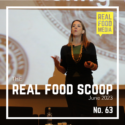Americans looking to cut back on meat are following a movement forged by a groundbreaking book, ‘Diet for a Small Planet.’
By Clyde Haberman, The New York Times
Even as Americans mass in cities and their suburbs, the range-roaming cowboy has endured as a national symbol, along with the cholesterol-laden diet he represents: heavy on steaks, hamburgers, sausages and the like. What if that iconic image were replaced someday by, say, a technician in a lab coat producing a facsimile of a traditional burger, one made from plants and not animals?Not very likely, you say? Perhaps not right away. But the lure of the cowboy notwithstanding, more Americans than ever are eating plant-based meat, convinced that it is less harmful to them and less taxing on the environment. Millennials in particular are giving the phrase “all sizzle, no steak” a positive spin it never had.This slow but perhaps inexorable shift in food preferences is explored by Retro Report, whose mission is to focus on how the past influences present-day policies and customs. In this video offering, it turns to Frances Moore Lappé, whose 1971 best-selling book “Diet for a Small Planet” changed the way many people viewed global hunger in an era of rapid population growth. Ms. Lappé (pronounced Luh-PAY) concluded that there was plenty of food to go around. The problem, she said, was one of distribution. Too much of it went to nourish animals on four legs rather than directly to those on two.“I just said, “O.K., I’m going to figure out are we really at the Earth’s limits — is that really the cause of hunger?” she told Retro Report. She took her father’s slide rule and “just sat there hour after hour literally putting two and two together.” Her bottom line: The world’s grain supply was “more than enough” to feed every human on the planet.
“What I wanted to get across is that our current food system is inefficient, unjust, illogical and destructive,” Ms. Lappé said, adding, “We need not have hunger.”
The inefficiency of a diet based on animal protein is evident in more recent studies as well. In one chart, Ms. Lappé illustrated how more than 21 pounds of protein fed to a cow made just one pound of protein for people. According to United Nations researchers, roughly 80 percent of agricultural land worldwide is used to sustain livestock, a proportion that is unlikely to drop much when a leader like Jair Bolsonaro of Brazil is committed to deforesting the Amazon to clear a path for more cattle raising.“We use 77 percent of our agricultural land in the world for livestock that gives us 17 percent of our calories,” Ms. Lappé, 76, told The New York Times Magazine in 2019. Those figures reflect the great influence wielded by the cattle business, she said: “I’m saying that if we had real democracy, if the agribusiness industry and the meat producers didn’t have the political wherewithal that they do, then we could really talk.”There is also the impact on the air that surrounds us. Animals belch and break wind copiously, releasing huge amounts of methane, a prime greenhouse gas. When it comes to carbon dioxide, the University of Michigan’s Center for Sustainable Systems calculates an emission of 6.6 pounds for every 4 ounces of beef that is served. By yet another measure, the United Nations Food and Agriculture Organization says that livestock accounts for about 14.5 percent of global greenhouse gas emissions, with two-thirds of the total coming from cattle alone.In short, the studies suggest that devoting vast tracts of land for the purpose of converting plant energy into animal energy is as inefficient a method as can be for humans to get their protein.
Perhaps not surprisingly, these findings have encouraged the production of alternative meats, though cattle ranchers and their supporters in some statehouses are pursuing legislation to ban the word “meat” for anything other than that which comes from a live animal. A decade ago, Ethan Brown started a company called Beyond Meat, producing plant-derived burgers and other foods that their advocates say have all the sizzle, smell and taste of the animal variety. They require far less land and water, and lead to far fewer greenhouse gas emissions, than traditional meat production.“If we can make it so it tastes and delights just like animal protein, I mean, very few consumers are going to say, ‘Nah, I just don’t want to do that,’ ” Mr. Brown said to Retro Report.Perhaps also not surprisingly, meat producers and their allies have pushed back against the notion that tofu or other protein sources make the grade. They challenge, for instance, the notion that plant-based burgers are healthier, noting that while those foods have less saturated fat and no cholesterol, they also are very high in sodium content. As for the planet’s well-being, they say that meat production’s contribution to greenhouse gas levels is greatly overstated.To be sure, McDonald’s and its brethren are not about to shut down anytime soon. Across a 12-month stretch ending last May, beef burgers outsold plant-based ones at fast-food outlets by a margin of 28 to 1 — 6.4 billion servings compared with 228 million. Still, plant-based producers believe they are riding a commercial tide.Jaime Athos, the chief executive of Tofurky, a company whose products are rooted in soy protein, pointed to sales figures from the last two years, when real-animal meat sales were flat while sales of meat alternatives grew by about 37 or 38 percent. “So that’s how a revolution happens, that kind of growth rate,” he said.Anna Lappé, like her mother a food writer and environmental activist, told Retro Report that her interests go deeper. The effects of food production on the world’s ecology deserve greater attention, she said. “I think the question should be not just is something meat or is not meat, but were pesticides used, toxic pesticides,” the younger Ms. Lappé said. “Were synthetic fertilizers that are incredibly energy intensive to produce? All of these questions go into essentially understanding what is the impact of the food we’re eating.”Her mother, meanwhile, is convinced that “there’s been enormous change in our culture around food since I wrote my book.”That would seem indisputable. And who knows? If sales of plant-based meat soar, we may even need to rethink those cowpokes who ride the range. Take an old country hit like “Mammas, Don’t Let Your Babies Grow Up to Be Cowboys.” It might better serve a new generation if “don’t let ’em pick guitars or drive them old trucks” were followed by a line like “make ’em eat tofu and whole grains and such.”The video with this article is part of a documentary series presented by The New York Times. The video project was started with a grant from Christopher Buck. Retro Report, led by Kyra Darnton, is a nonprofit media organization examining the history and context behind today’s news. To watch more, subscribe to the Retro Report newsletter, and follow Retro Report on YouTube and Twitter.
Originally published in The New York Times.



